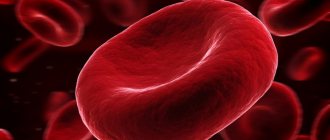Causes of protein in urine
- Physiological , in which the appearance of protein in the urine is a functional feature of the body.
- Physical activity , which causes an increase in protein metabolism, and eating large amounts of protein-rich foods. These situations arise among athletes and bodybuilders, especially those trying to build muscles in this way.
- Postural (orthostatic) proteinuria occurs during prolonged standing or walking in patients suffering from spinal curvature. The spinal column compresses the inferior vena cava and disrupts blood flow in the renal vessels, which leads to the appearance of protein in the urine.
- Pregnancy - protein in the urine is a sign of late toxicosis. However, small amounts of albumin late in pregnancy are not considered dangerous.
- Hypothermia and overheating of the body - in this case, failures in the functioning of the kidneys are possible, which go away on their own.
- Stress proteinuria , which occurs during psychological stress.
Pathological, caused by improper functioning of the urinary system and pathologies of other organs:
- Renal - in this case, the appearance of protein in the urine is caused by pathologies of the excretory system - nephritis, early renal failure, pyelonephritis, urolithiasis, tumors, cystitis, renal tuberculosis, diabetic kidney disease.
- Prerenal - appears when there is a high concentration of protein in the blood, which the kidney structures do not have time to filter. Common causes of this condition are malignant bone marrow tumors, destruction of red blood cells, myopathies (impaired muscle function), and leukemia.
- Extrarenal - appears in the urine in diseases that affect not only the kidneys, but the entire body. Albuminuria can appear with heart failure, intoxication, infections, hypertension, and metabolic disorders.
To identify the cause of proteinuria, you need to contact a urologist who will conduct an examination. In some cases, consultation with other specialists is necessary - a gynecologist, oncologist, hematologist, therapist, phthisiatrician.
Renal and extrarenal proteinuria
There are renal and extrarenal proteinuria.
Renal proteinuria
There are two types of renal:
- Tubular or tubular
- Glomerular
Tubular occurs when:
- Acute interstitial nephritis
- Immunosuppressive therapy
- Long-term use of NSAIDs (non-steroidal anti-inflammatory drugs)
- Cryoglobulinemia (presence in the blood of specific cryoglobulin proteins that cause the development of systemic vasculitis).
- Sjögren's syndrome
Glomerular (occurs due to damage to the glomeruli) occurs in various types of glomerulonephritis.
Extrarenal proteinuria
Extrarenal proteinuria occurs
- prerenal (overflow proteinuria)
- postrenal.
Overflow proteinuria occurs due to increased production of abnormal low molecular weight proteins, which can cause acute kidney injury. Occurs in the following diseases:
- Multiple myeloma
- Rhabdomyolysis (destruction of muscle cells).
Causes of postrenal proteinuria:
- Urinary tract infections
- Urolithiasis disease
- Tumors of the kidneys and urinary tract
What symptoms accompany proteinuria?
- Swelling.
- Feeling unwell – dizziness, weakness, headache, fever, poor appetite.
- Bleeding, bruising on the skin.
Sometimes the appearance of the urine changes, becoming cloudy and taking on a reddish tint caused by blood.
In mild cases, the appearance of protein in urine is asymptomatic, appearing only during laboratory examination of urine. But even in this case, you need to consult a doctor and find out the cause of this phenomenon.
What stages does acute pyelonephritis go through?
The infection goes through two stages of the process: serous and purulent inflammation. The serous undergoes reverse development, but in some cases it passes into the purulent stage; it develops in every fourth patient in several forms: apostematous pyelonephritis, carbuncle and abscess.
During this period, the kidney is inflamed and swollen, the renal capsule stretches and this gives a feeling of pain. The fiber around the organ also swells, aggravating the pain syndrome. Fever is caused by the release into the blood of bacterial toxins, biologically active substances secreted by immune cells, and products of cellular decay. In case of a disease that arises from disturbances in the outflow of urine, all clinical manifestations are more pronounced.
What is dangerous about the presence of protein in urine?
Since protein compounds are involved in many metabolic processes and are used by the body as building material, their increased excretion in the urine can have unpleasant consequences:
- The concentration of proteins that regulate water content in the body decreases, which leads to edema . The release of albumin, which is responsible for blood clotting, in the urine causes bleeding and the appearance of bruises on the skin, the origin of which the patient cannot explain.
- The loss of proteins - immunoglobulins - leads to decreased immunity and frequent infection with infectious diseases.
- Metabolic disorders caused by improper protein metabolism lead to pulmonary edema and hemorrhages in various organs.
- The increased load on the kidneys due to the need to filter huge amounts of protein leads to kidney failure . Severe renal impairment occurs due to poisoning and infectious diseases.
Diagnosis of pyelonephritis by blood test
Diagnosis of kidney inflammation using a general blood test tends to zero in terms of specificity. There will be a lot of leukocytes, with a predominant proportion of neutrophilic forms, especially stab ones, accelerating the erythrocyte sedimentation reaction (ESR). This is a typical blood condition in any infection, proof that there is an inflammatory process in the body, but this is not enough to make a diagnosis of pyelonephritis.
Biochemical analysis will show the functionality of the paired organ only if the disturbances are significant.
We will call you back, leave your phone number
Message sent!
expect a call, we will contact you shortly
General urine analysis, if necessary - Zimnitsky test.
A three-glass test prescribed for albuminuria caused by damage to the genitourinary system. The patient urinates first in the first glass, and then in the second and third:
- Pathological changes in all three samples indicate kidney damage or tumor processes. With tumors, blood may be found in the urine.
- Deviation from the norm in the first glass indicates urethritis.
- If the strongest changes are found in the second portion , the patient has cystitis or prostatitis.
- Deviations in the third sample indicate isolated damage to the prostate and inflammation of the bladder.
Ultrasound of the kidneys, prostate and bladder shows the localization of the pathological focus, detects stones and tumors that cause disruption of the urinary system.
After determining the cause of the appearance of protein in the urine, the patient is referred for treatment to a urologist or other specialist. If albuminuria occurs during pregnancy, a woman needs to consult a gynecologist and perform an ultrasound scan of the fetus. Treatment is prescribed depending on the identified pathology. After the therapy, control tests are carried out.
How to prepare for analysis
The accuracy of the analysis depends on compliance with the rules. The glassware must be sterile so that the analysis is not distorted. It is also better to collect material in the morning so that food does not affect the composition of urine. Antibiotics, other medications, even herbal teas can also distort the chemical composition. It is also important to thoroughly wash your genitals.
After diagnosis, the doctor will select individual treatment. In most cases, the situation can be corrected by adjusting the diet; a strict low-protein diet will also have to be followed if the diagnosis shows serious kidney disease. Diseases such as diabetes and hypertension will require you to follow such a diet for the rest of your life, so take care of yourself and be careful.
This article does not constitute medical advice and should not serve as a substitute for consultation with a physician.
Symptoms of carbuncle and kidney abscess
In every third person, apostematous pyelonephritis is complicated by the formation of a large abscess - a carbuncle. There can be several carbuncles, usually with a diameter of no more than 2 cm. The abscess can open into the surrounding tissue and pus forms around the kidney.
With a kidney abscess, tissue necrosis first appears, for example, as a result of a blood clot from bacteria and blood clots blocking the vessels, then pus forms, but this variant of the disease is very rare.
With purulent melting, the temperature rises over 40°, the urine is almost purulent, the condition is extremely serious with a change in consciousness. Severe pain in the lumbar region when an abscess ruptures changes in character, the condition improves somewhat for a short time, then progressively deteriorates.
From the very beginning of the development of the disease, you should trust your health to doctors, and then the likelihood of developing purulent melting is negligible. Our doctors are able to quickly diagnose and treat correctly, contact the Urology Center for help by phone
We will call you back, leave your phone number
Message sent!
expect a call, we will contact you shortly
Both kidneys can become inflamed at once or one by one, so pyelonephritis can be bilateral or unilateral, then it is called according to the side of the lesion, for example, right-sided.
A single infection - acute pyelonephritis; if the disease occurs in waves with exacerbations and periods without illness, then it is a chronic process. Chronic pyelonephritis affects mainly women, which is due to a higher incidence of cystitis and impaired passage of urine through the ureters during pregnancy.
The international clinic Medica24 not only has excellent diagnostic equipment, but also specialists who are able to establish a diagnosis when the signs of the disease are not obvious and the interpretation of the examination results is unclear. Contact the Center for Urology and Andrology by phone: +7 (495) 230-00-01.
Is the prognosis always favorable?
In most patients, acute pyelonephritis results in complete recovery. In some cases it becomes chronic, alternating between activity and “sleep” of the infection. Due to concomitant severe chronic diseases and the resulting immune deficiency, infectious-toxic shock may develop; every fifth patient dies from it.
Purulent inflammation of the kidney leads to scar tissue changes and, naturally, a decrease in functionality; with a healthy second kidney, all this is more than compensated for and the person lives a normal life. Even without one kidney, you can feel quite normal and live a long and quality life.
At the international clinic Medica24, an individual approach is applied to each patient based on the clinical recommendations of the world's leading medical doctors, so our patients are focused on optimal results and a speedy recovery. Contact a specialist from the Urology Center for help by phone: +7 (495) 230-00-01
What urological causes can lead to pyelonephritis?
For every five women with kidney inflammation, there is only one man; in him, the most common cause of the disease is typical urological problems:
- Condition after urological surgery in general, when immunity decreases, and installation of a catheter in the bladder in particular;
- Neurogenic bladder, the treatment of which is not yet so effective;
- Blockage of urine outflow through the ureter by a stone or narrowing after injury.
We will call you back, leave your phone number
Message sent!
expect a call, we will contact you shortly










